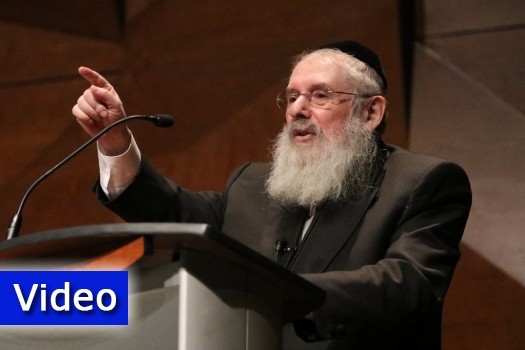
Rabbi Mangel speaks at Colorado State University
March 16, 1944, the Nazi army invaded Hungary and the home of Holocaust survivor Rabbi Nissen Mangel. By the end of May, his family was in Auschwitz. “I was in the threshold of death,” Mangel said. “In a year in these death camps day in and out. I was in complete danger of death.”
Mangel, a renowned speaker and philosopher, has traveled around the world sharing his story. He traveled to Colorado State University Monday, where hundreds gathered in the Lory Student Center Theatre to hear him speak about surviving history’s most infamous genocide.
Mangel visited CSU in honor of Holocaust Awareness week, organized by Colorado State University’s Students for Holocaust Awareness, Hillel: The Foundation for Jewish Campus Life and Chabad Jewish Organization.
At 10 years old, Mangel evaded death at six other concentration camps, the Death March and encounters with Dr. Josef Mengele, the Angel of Death, who inhumanely experimented on child inmates.
After liberation, Mangel immigrated to America and chose to live a life dedicated to the Jewish community as a scholar, author, speaker and philosopher of Judaism.
As the youngest child inmate at Auschwitz, Mangel credits his survival to God. He says that even though other survivors claim there is no God because of the experiences in the death camps, he believes God did not abandon him.
“I never gave up hope and trust in God,” he said. “I always had, at least on the back burner, a rope to God. He holds me and I’m not alone. I always felt something controlled me — an invisible wire.”
Despite the conditions of the camp, Mangel experienced acts of kindness that he believes saved his life.
“This person came over to me and said ‘don’t give up, I will help you.’ Can you imagine a bigger act of kindness?” Mangel said. “And afterwards, he was repaid. I helped him. But he saved my life when my whole left side was completely numb. In these death camps, nobody spoke to each other. Everybody was thinking of how they could survive.”
Zack Josephs, sophomore philosophy student, is on the board of Hillel. According to him, listening and absorbing as much as he can from Holocaust survivors is a once in a lifetime experience.
“It is a wonder how long we’ll get the chance to hear their experiences in person,” Josephs said. “I just hope by spreading awareness of particularly dangerous ideologies, we can work toward recognizing that we are all human beings at the end of the day.”
Alex Ingbar, sophomore political science major, is the president of Holocaust Awareness Week and vice president of Chabad. He said that Mangel’s message is applicable for all religious affiliations.
“Especially with today’s circumstances for Jews around the world, it is important for people to be aware of anti-semitism,” Ingbar said. “It is essential that no religion has to suffer because of their identity.”
Mangel stands by his notion that those who survived did so miraculously.
“Why did God spare me and not the 1.5 million children? I do not know,” Mangel said. “But if I’m here, it is only by divine intervention.”
Holding up his arm with his identification number, he said, “Ladies and gentlemen, I consider this tattoo a badge of honor.”














